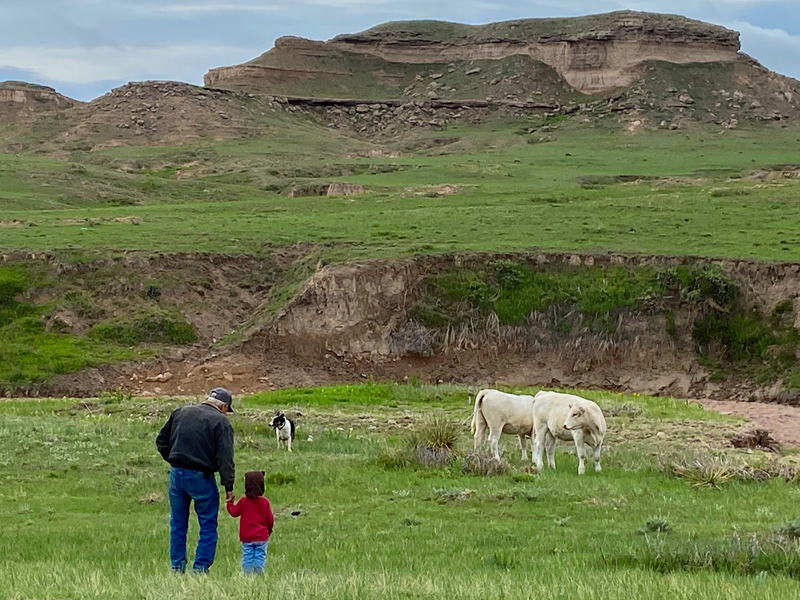


A career combo
Photos courtesy of Robert Wagner June 25, 2021
Pioneering DNA researcher merges science, ranching
Suppose you own racing pigeons and want to learn if a particular bird has a mutation that might make it speedier in lucrative competitions. Or you’re a sheep rancher whose livelihood depends on knowing which of your animals are genetically susceptible to a deadly disease.
For answers, you could turn to University of Delaware alumnus Robert Wagner Jr., Class of 1972, a pioneering DNA scientist with a Harvard doctorate and several patents, whose successful biotechnology firm features a dynamic research program and develops genetic tests for animals.

Now, suppose you’re a cattle rancher and want to purchase a bull with an impressive bloodline, or a hard-working border collie, to add to your operation.
You could turn to Bob Wagner, who with his wife, Jan, owns and manages a 6,000-acre cattle and sheep ranch in northern Colorado, well-known for its annual Wagner Ranch Bull Sale and for the border collies the couple breeds, raises and trains.
That’s right — the same person.
To Wagner, who received a 2020 College of Arts and Sciences (CAS) Alumni Achievement Award in recognition of his professional accomplishments and public service, there’s nothing unusual about a life that combines laboratory science with ranching. (To read about the other CAS alumni award winners, see this article.)
“I’ve always had one foot in two different camps,” he said. “When I was a [UD] student, I was taking high-end academic classes, but all my friends were football players. … When I was doing research in a lab in Europe, I was commuting there from a small farm where I lived in the northeastern United States.”
Raised in Silver Spring, Maryland, Wagner came to UD with one goal: to play football. By his junior year, the defensive tackle had decided he was “too small and too slow” to continue playing. He threw himself into his classes as a biological sciences major and, he said, “became enamored of research.”
His success in the classroom and laboratory enabled him to leave UD in the middle of his senior year and start graduate school at Harvard, where he worked under Prof. Matthew Meselson, a genetic researcher who made groundbreaking findings about how DNA replicates and who discovered messenger RNA. With DNA science still developing, it was an exciting time to work in molecular biology, said Wagner, who earned his doctorate in 1976.
Also that year, he and Meselson published a paper characterizing DNA mismatch repair — the process by which DNA is able to correct most of the random errors that inevitably occur when it is replicating. The discovery of this mechanism won wide acclaim for Wagner and Meselson, whose names appear on a Chemical and Engineering News short list of scientists considered unfairly overlooked in later Nobel Prize selections.
Wagner continued his genetic research, working with Miroslav Radman, who had also been a member of Meselson’s team at Harvard, in a lab in Europe. From his small farms in New York state and then in Maine, Wagner flew to Europe regularly for weeklong stints of research with Radman, often followed by the publication of a paper.
“We did an incredible body of work” in that collaboration, Wagner said, and in 1993 they founded Gene Check Inc., a private biotechnology company, in Colorado. Gene Check used the founders’ DNA research to develop mutation-detection methods and commercial applications of those methods that are used by the research community and by sheep breeders and other veterinary users.
Today, the company does much of its testing on sheep, primarily to determine if an animal is susceptible or resistant to scrapie, a deadly prion disease similar to mad cow disease in cattle. The lab, which has customers worldwide, is certified by the U.S. Department of Agriculture and has been awarded several research grants.
Wagner, who initially planned to become a veterinarian, said his postgraduate experience living on farms showed him connections between farmers and researchers.
“Good farmers and ranchers are very much like scientists — but in a more practical way,” he said. “They observe what works, and they’re willing to experiment with new things. You can’t really be successful if you just say, ‘We always did it this way.’ ”
After moving to Colorado, Wagner met his wife, Jan Gillespie, an anesthesiologist. Together, they bought land near the Wyoming border, where they built a house and operate Wagner Ranch in addition to their other careers.
Wagner is president and CEO of Gene Check, where he continues to conduct research. He said he especially likes training young researchers, often hiring them directly from their undergraduate studies. He is also mentoring three UD students, meeting with them remotely and offering them career advice.
“They’re all doing extremely well academically, so they didn’t need help with that,” Wagner said. “Mostly they were just looking for guidance. … I love teaching young people; I think it goes back to when I coached [high school] football.”
Wagner said his dual roles as a scientist and a rancher keep him energized and challenged.
“I like to be consumed by what I do, and I want a variety of experiences,” he said. “Gene Check doesn’t make a lot of money, but we fill a need and it’s important to me. I do it because I love the science.”
Contact Us
Have a UDaily story idea?
Contact us at ocm@udel.edu
Members of the press
Contact us at 302-831-NEWS or visit the Media Relations website

